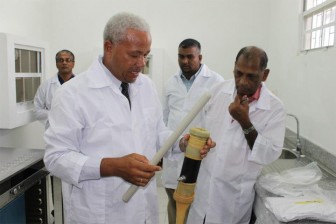The Ministry of Agriculture has commissioned a $28.2M Genetic Improvement Lab which will facilitate the realisation of artificial insemination and other services critical to the success of the Guyana Livestock Develo-ment Authority (GLDA) and livestock industry.
The lab was built under the Agriculture Diversifica-tion Programme with the said sum provided by the Guyana Government and the Inter-American Development Bank to facilitate research and improved farming practices, a press release from the Government Information Agency (GINA) said.

Minister of Agriculture Dr Leslie Ramsammy underscored the importance of the lab, noting that the animals seen on the premises of the GLDA are not “just the image of another farm but science at work and technology being made useful to serve not just the professionals but the economic aspirations of farmers.”
The minister said he hopes everyone will be proud of Guyana’s new genetic testing capacity in the livestock industry as not many developing countries have achieved same. “We in Guyana have had the support of professionals from developed countries and, we, today have our arms open to embrace our professional colleagues in other countries… I am proud because our genetic capacity is being developed on the backs, knowledge and wisdom of Guyanese men and women,” he said.
Ramsammy said while the opening of the lab indicates that there has been progress, more work is still to be done to ensure that the various elements of genetic and breeding improvement project are developed and matched with critical human resources, infrastructure and technology. So far the lab boasts technology valued at about $80 million.
In his address, Dr Robin Austin said the establishment of the genetic improvement lab is testimony to the evolving nature of the GLDA sub-sector particularly in the area of genetic improvement. “Central to any national thrust in genetic improvement is the establishment and proper functioning of a genetic improvement lab,” he added.
Dr Austin explained that the role of the lab is essentially to support and advance the genetic improvement programme which is already in place and this is mainly for cattle—dairy and beef—and to an extent sheep.
It is also anticipated that the lab will be able to do embryo production and transfers. Semen will be collected, analyzed and stored at the lab and will be distributed to the farmers, GINA said.








